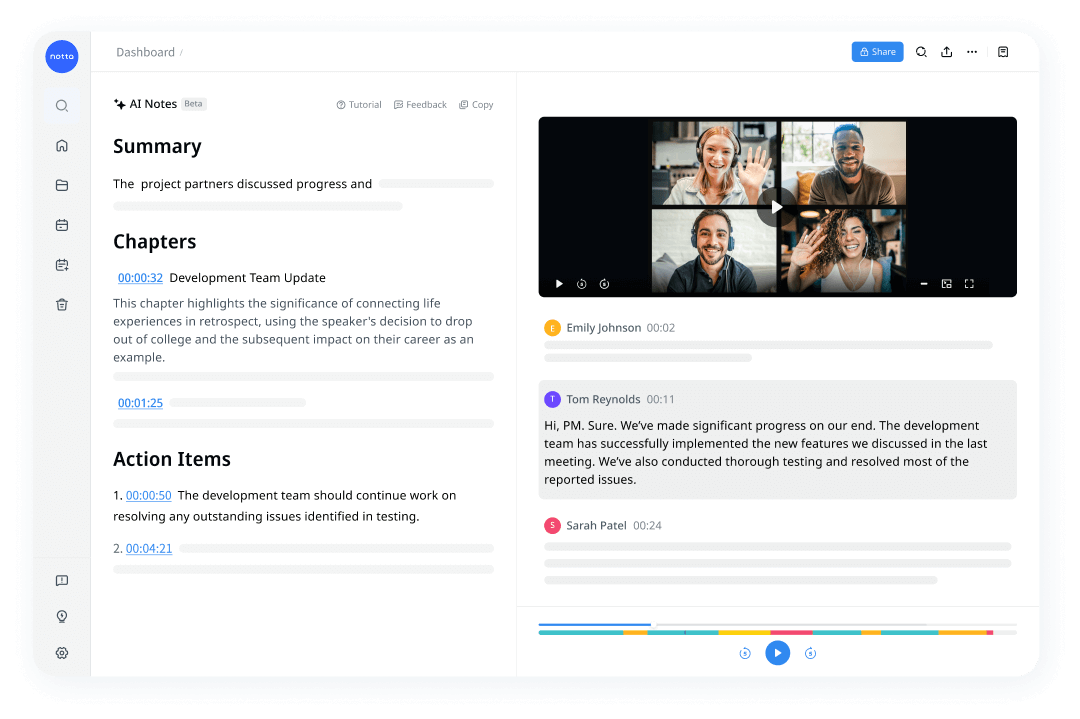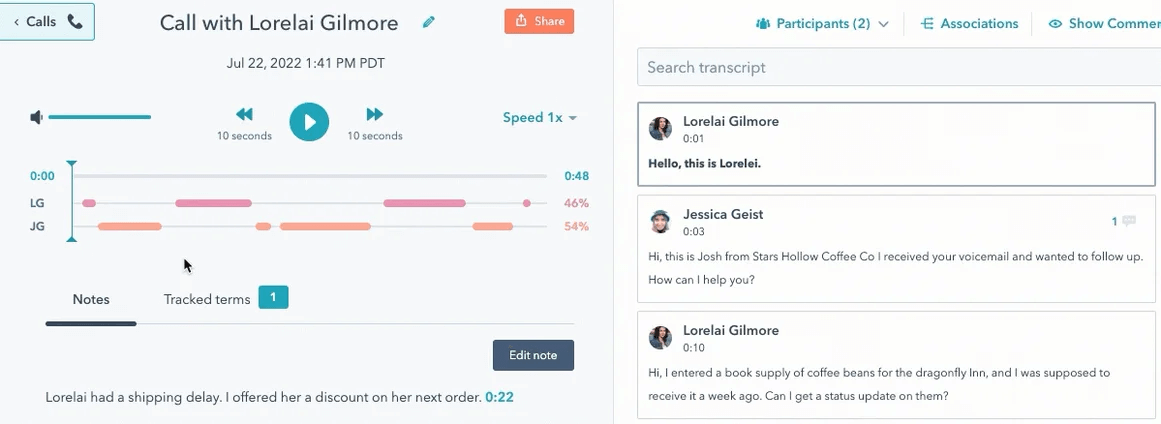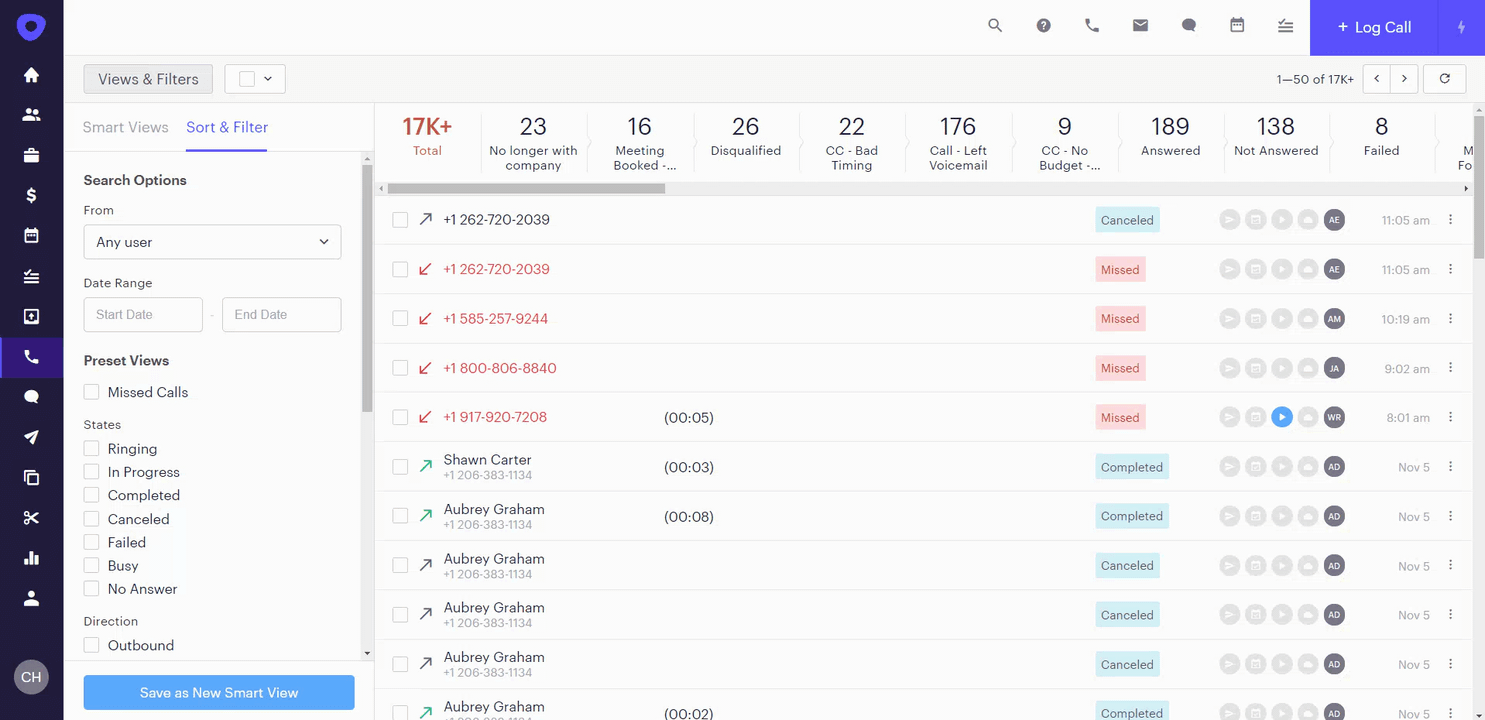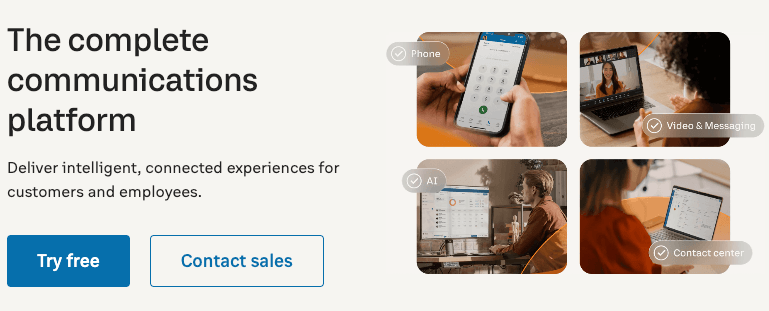Read more: Is It Illegal to Record Someone Without Their Permission?

How to Use Sales Call Recording to Improve Sales Performance
Record, transcribe and summarize conversations with one click.
Did you know that your sales performance is heavily dependent on the effectiveness of your sales calls approach?
Well, according to different statistics, it is! For one, 92% of all customer interactions happen on the phone. Also, organizations that don’t cold call experience 42% less growth than those that do.
Therefore, as a sales manager or salesperson looking to improve and maximize sales performance, you have to learn to make more impactful sales calls. And the first step to doing that is to record sales calls.
This practice allows you to capture and analyze sales calls, gain unique insight into your internal sales processes and customer interactions, and identify opportunities for improvement.
Can you Record Sales Calls?
Yes, you can. However, you must do it in compliance with applicable laws and obtain the explicit consent of participants on the call.
If you are considering leveraging sales call recordings, there are best practices and legal considerations that you must familiarize yourself with. And this guide will explore them extensively.
Why record sales calls?
A sales call is a conversation between a salesperson and a lead or customer to promote a product and close a sale.
Sales calls can take various forms, including phone calls or video conferences, depending on the nature of the business and the preferences of the parties involved. Both of these sales call forms can and should be recorded.
Why, you ask? The short answer is that the recordings offer invaluable information and insight necessary for improving sales.
So, if you are still relying on your memory or handwritten notes for details of your sales calls, here are some reasons you should consider recording the calls instead.
Training: Sales call recordings are often used as training resources because they allow sales representatives to listen to real-life interactions, discover sales techniques, and learn from one another.
Customer insights: Sales call recordings provide valuable insights into customer needs and preferences. Businesses can gain a deeper understanding of their target users, identify common objections, and uncover opportunities for improvement by simply analyzing sales calls.
Compliance and dispute resolution: In certain industries, recording sales meetings may be a legal requirement to ensure compliance with regulations. Additionally, recorded calls could serve as a factual record of conversations, helping resolve disputes or misunderstandings that may arise during the sales process.
6 ways to leverage sales call recordings
As a sales manager or rep, you can leverage the insights and learnings from recorded sales calls to improve your connection with prospects and customers and hit your sales target.
For sales managers
As a leader, you must chart the best course for your team to achieve individual and collective sales goals. But you should not be daunted by this. With sales call recordings, you have all the information necessary to make the needed changes at your fingertips.
1. Identify sales best practices
By analyzing sales calls, you can identify sales techniques, strategies, and communication styles that consistently lead to positive outcomes for your team members. If you are unsure how to analyze sales calls to identify best practices, here is a five-step guide:
Gather and organize recordings from your team
Determine the specific sales techniques, strategies, and communication styles you want to analyze.
Listen and take notes
Identify patterns and trends
Extract key learnings
2. Coach the sales team
Instead of attending reps’ sales calls to evaluate their performance, you can now watch the recordings at any time and help your reps improve their sales performance in the following ways:
Providing personalized feedback based on actual customer interactions can have a significant impact on individual sales performance.
Identifying upselling and cross-selling opportunities. You can spot missed upselling or cross-selling opportunities by observing whether your team effectively identifies customer needs and recommends relevant additional products or services.
Benchmarking performance. Compare sales call recordings across your team to identify top performers and those who may require additional support.
The library of recorded sales calls is also an invaluable resource for training new reps.
3. Optimize your product
It is easy to become out of touch with customers if you are a sales manager overseeing a team of representatives. Most of your daily tasks might revolve around administrative duties but, you need to have your finger on the pulse of the market to stay effective. And there’s no better way to do this than by analyzing customer conversations.
Sales call recordings allow you to get direct feedback on your product from your users and understand what the average customer wants or responds to. This is a goldmine of information!
You can gain insight that helps you answer questions like:
What features do customers value the most in products in our niche?
What are the common complaints about our product?
Why do they prefer our competitor?
How does the average customer feel about our prices? How much are they willing to pay for our product or service?
These learnings will help optimize your product for your existing customers and target market!
With Notta, you can easily generate meeting minutes, turning spoken content into written records with 98.86% accuracy.
For sales representatives
About six calls are required to turn a prospect into a customer. So, it’s clear that your work as a sales representative is cut out for you. But the good news is that you can record client meetings and learn from them to make the conversion process easier and more rewarding. Here is how you can take advantage of the sales call recordings.
4. Improve your sales techniques
Enhance pitch delivery. By evaluating recorded sales calls, you can assess your delivery of the sales pitch to identify areas where the pitch can be refined to create a more compelling and engaging message.
Improve objection handling. How well do you handle customer objections? You can note common objections, evaluate how effectively you address them, and develop persuasive responses.
Fine-tune closing techniques: Review your recorded sales calls to assess the effectiveness of your different closing techniques and what you can do better. You want to ensure that you properly frame your call to action, consistently on a high note, and spark curiosity.
5. Connect better with your prospects
“Strong customer relationships drive sales, sustainability, and growth.” - Tim Cates
Everyone likes to feel valued and expects you to remember their names and the details of all your interactions. Being able to meet these expectations gives them the impression that you care about them and this makes them more open to building a relationship with you.
However, with the average salesperson making 30 calls a day, this is near-impossible - except, of course, if you record all conversations.
You can further leverage call recordings to build relationships in the following ways:
Picking up on subtle cues, tone of voice, and nuances that may have been missed during the live call.
Learning the personal preferences, communication styles, and interests of your leads.
Demonstrating emotional Intelligence.
6. Use it as a point of reference
As part of your preparation for subsequent conversations with leads or customers, you should revisit previous call recordings to refresh their memory on decisions and any unresolved issues.
Also, in cases of customer disputes or misunderstandings, sales call recordings can be used as evidence to clarify what was discussed during the call.
The 5 best sales call recording software
Selecting the right sales call recording software for your team from the several options in the market could be tedious. We have, however, helped you narrow down the options to five of the best and most versatile sales call recording tools.
1. Notta
If you are looking for a tool that simplifies call recording while allowing you to build a searchable knowledge base out of all recordings (great for creating sales enablement content), Notta meeting recording software is for you!
This tool is compatible with popular video conferencing apps like Zoom, Google Meet, MS Teams, and Webex, so you don’t need to switch on several recording tools.
What’s more, it takes the burden of taking detailed notes off you with its live transcription feature, so that you can focus on the conversation. When the meeting is over, Notta uses AI to generate a meeting summary for easy follow-up with customers! Therefore, you can literally fold your arms during calls and allow Notta to handle your call records.

How to Record Sales Calls Using Notta?
Step 1: Sign up for Notta for free and create a workspace where all your recorded sales calls will be saved.
Step 2: Once your sales call starts, go to the Notta dashboard; click ‘Transcribe Live Meetings’ and select the conferencing platform you are using.
Step 3: Paste in the meeting link, choose the transcription language and then click on ‘Transcribe Now’.
Step 4: Admit the Notta Bot to the call. And voila! Notta will immediately start recording and transcribing your call concurrently.
Once the meeting is over, you may replay the recording and share the most important moments. Its integration with Salesforce and Notion also greatly enhances your workflow and makes your work more efficient.
Notta offers the most integrated AI meeting notes, summaries, and action items so nothing gets missed.
2. Hubspot Call Recording

HubSpot, mostly known as a CRM, also offers an inbuilt call-recording system. Its diverse range of features allows users to centralize their customer and sales pipeline management from prospecting and lead qualification to closing a deal.
3. Gong

Gong automatically records sales calls on video conferencing and phone and provides intelligence and insights on individual reps and teams’ potential deals, members’ performance and sales approach, and key moments from the recorded calls.
4. RingCentral

RingCentral’s impressive cloud storage and call processing capacity makes it ideal for teams with large volumes of inbound and outgoing sales calls. With up to 100,000 calls storable per account, it provides enterprise-scale businesses space for their recordings.
5. Avoma
Avoma creates audio, visual, and textual sales call records and analyzes conversations to generate insights necessary for data-driven decision-making.
It also simplifies managing and aligning on organization-wide sale projects by presenting reps’ call details across the organization in a simple and accessible form.
Best practices for recording sales calls
The following best practices are crucial for ethically and effectively obtaining and using sales call recordings.
1. Understand the local laws
Different jurisdictions have specific laws that regulate the process of obtaining, using, and disposing of the data and information from sales calls. It is, therefore, crucial to understand and comply with those local laws and regulations.
Some key aspects of the law to pay attention include:
Notification obligations: Some jurisdictions require that you inform the participants on the call that the recording will take place. This means you may need to provide prior notification to all participants about the recording and its purpose.
Storage and security: The laws enable you to take appropriate measures to protect the recordings and ensure they are stored securely to prevent unauthorized access or disclosure.
Cross-border considerations: If you operate in multiple jurisdictions or conduct sales meetings across different regions, it is essential to be aware of the specific recording laws in each location. Understanding these differences helps you navigate the legal landscape and ensure compliance wherever the sales meetings take place.
Retention period: Local laws often stipulate how long companies can keep sales call recordings and data in their records. It is important to know precisely how long you can retain these records before deleting them.
After all that has been said, we strongly recommend consulting with legal professionals to help you navigate the specific regulations applicable to your jurisdiction.
2. Obtain consent from the other party
It is good practice to always seek and obtain consent from the prospect or customer before proceeding to record the conversation.
In the United States, consent laws vary by state; some require all parties to a conversation to give their consent, while some only require one party’s consent.
Consent must be explicit and informed for it to be valid. Here are a few examples of how a salesperson can ask for consent:
"Before we continue, I just want to let you know that I'd like to record this call for quality assurance and coaching purposes. Is that okay with you?"
Do you mind if I record this call for training and compliance purposes?
"To make sure I don't miss any important details during our call, I'd like to ask for your permission to record this call. Is that alright with you?"
In addition to the fact that obtaining consent is often a legal and ethical requirement, it demonstrates professionalism and respect for the other party in the conversation, which helps to build trust.
3. Store the recordings securely
Protecting the data of your customers and prospects is an absolute requirement. You must safeguard all recorded calls and any associated data.
It is also vital to implement measures to protect against unauthorized disclosure or misuse of the recordings.
Some things you can do to guarantee the privacy of your customers include:
Anonymizing or de-Identify personal information
Minimize the collection of sensitive information
Train employees on privacy protocols
Store information securely and restrict access to only authorized personnel
Regularly update security measures
Delete records when they are no longer needed
Wrapping up
Sales call recordings are, indisputably, a valuable asset for salespersons and teams striving for continuous improvement, customer-centricity, and success in today's competitive business landscape.
Embracing call recording software and incorporating it into sales strategies can undoubtedly contribute to better sales outcomes and strengthened customer relationships.
Good luck!